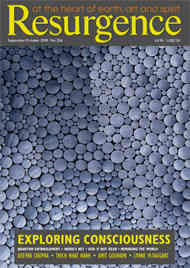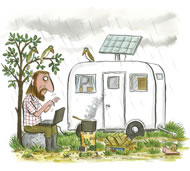I am now seven months into my experiment of living without money and fossil fuels for a year, and my journey so far has been fascinating. When I first decided to go money-free last year, I set about putting in place the basic infrastructure I would need to survive. The first essential part of this jigsaw was shelter. For this I turned to an amazing project called Freecycle, and through it I found a caravan that someone else didn’t want any more. However, I also needed somewhere to put my new home, and so I decided to go and volunteer for three days a week with a local organic farm in return for a place to park my humble abode. If I had equated this in terms of my previous salary, it would be like paying penthouse-apartment rent for what is effectively a little tin box. That is the type of thinking, however, that I am trying to get away from.
Having no means of paying bills for a year, I was going to have to be completely responsible for producing all my own energy, and so my next challenge was to set this home up to be completely off-grid. For heating I installed a woodburner that I had converted from an old gas bottle, using a flue pipe I salvaged from the skip. This I fuelled using wood from trees coppiced on the farm, meaning fuel miles became fuel metres.
Next on my list was a cooker, so a local member of the Freeconomy Community showed me how to make a rocket stove from a couple of old olive-oil catering tins that were destined for landfill. This meant that for the next twelve months I was going to have to cook outside. At first I felt a touch overwhelmed at the thought of cooking in the snow, rain and northerly winds that inevitably come with the British winter. But, surprisingly, it became one of the joys of my life. Whilst feeding the stove with old broken-up vegetable boxes, I would watch the moon rise in the winter, and the sun set in the summer, in the length of time it took to prepare my evening repast. The birds that inhabited the trees surrounding my new kitchen became my ‘iPod’, and observing the local wildlife taught me much more about Nature than any documentary I’d ever seen on the television.
The one thing I did spend money on before starting the experiment was a solar panel to supply me with enough electricity for a light, my laptop and a phone on which I could only receive calls. I understand that this may seem ironic to some. However, I see money as I do fossil fuels: that we should be using what we have now to build a sustainable infrastructure for the future. Solar power isn’t ideal, because of the embodied energy involved in producing the panels, but I accepted that I was at the start of what would likely be a lifelong journey and that I couldn’t expect perfection straight away. That aside, the solar panels work reasonably well, providing me with ample light, but I found that in the winter my phone and laptop time were severely restricted, which I did find frustrating – but only because my expectations were based on having infinite energy at the touch of a button.
The last piece of this off-grid puzzle was a compost toilet. This wonder of appropriate technology should be the symbol of the entire Transition movement, in the same way that the spinning-wheel became a symbol of Swadeshi in Gandhi’s India. It represents sanity and a respect for the Earth. I made my alternative loo out of old pallets from a nearby hardware store. As I can no longer buy toilet roll, I relieve the local newsagent of some of the newspapers that fill its bins every day and use them instead. It may not be the height of luxury but it quickly becomes normal. In doing so I not only get to save the odd tree and reduce the energy burden we place on recycling companies, but I also get to keep up with the daily news, albeit a little late!
APART FROM MY basic infrastructure, food was my only other real necessity. There are four ‘legs’ to the ‘food for free’ table. Growing your own is the first of these, which is what I have been doing at the organic farm where I live. My preferred leg is wild food foraging, as it is nutritionally exceptional and without question the most gentle on the Earth. The third leg – using waste food from local restaurants and shops – is an incredible resource to draw on; whilst I am not comfortable with the fact that its existence is dependent on the waste of industrialised society, I feel I have an obligation to use this before I use any other form of energy to produce food. The last leg of this food table is barter, which involves using my skills or any excess food I’ve produced to meet any needs not met by the other methods.
My normal lunch has each of these legs represented in it: waste bread topped with a jam I made from a combination of plums from my old allotment and apple juice from our orchard. Along with this I have some salad I grow on the farm together with sprouts I grow from rye grain I bartered for. All this is washed down with a fresh nettle and cleavers tea that grew within three metres of my alternative cooker.
One of my major realisations so far, though, is that in a moneyless world everything takes much more time than in the world of modern conveniences. Hand-washing my clothes in a sink of cold water, using laundry liquid I made by boiling up some nuts on my rocket stove, can take two hours of labour from start to finish, instead of the normal twenty minutes or so using a washing machine. Cycling the thirty-six-mile round trip to the city obviously takes a lot more time and energy than driving or catching the bus or train. This does, however, provided me with a practical alternative to my old gym subscription, and I find cycling much more enjoyable than using motorised vehicles.
Finding stuff in skips – such as the steamer I cook with – takes longer than popping out to the shops for it. Sorting out the compost toilet is a lot more hassle than flushing it ‘away’. And the list goes on. The key point, however, is that I would rather have my time consumed making my own bread outdoors than kill time watching some ‘reality’ TV show in the room that we call ‘living’.
PEOPLE OFTEN ASK me what I miss most about my old life. I tell them I miss out on bank statements, utility bills and the inevitable traffic jam on the way home from my old stressful job on any given Monday. Oh, and a pint of organic ale with my mates down the local. •
Mark Boyle is the Founder of The Freeconomy Community.








